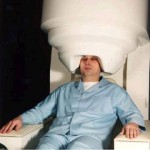MEG Scanner Use Rising
 The rising star of brain imaging is magneto-encephalography (MEG). Though the technology is far from new and the device looks like something from a 1950s science fiction movie, improvements in hardware and computing power are spiking interest in the technology for both medical and non-medical research. There are now about 100 MEG scanners in the world, with an approximate price tag of $2 million each. An article a few months ago in Wired described the growing interest in MEG technology:
The rising star of brain imaging is magneto-encephalography (MEG). Though the technology is far from new and the device looks like something from a 1950s science fiction movie, improvements in hardware and computing power are spiking interest in the technology for both medical and non-medical research. There are now about 100 MEG scanners in the world, with an approximate price tag of $2 million each. An article a few months ago in Wired described the growing interest in MEG technology:
“The MEG is just exploding,” said Robert Knowlton, director of the University of Alabama at Birmingham’s Magnetic Source Imaging Laboratory. “It’s been around a long time, but it’s only now gotten into enough researcher’s hands with the technology (being) mature enough.”
While other types of brain scans detail the geography of the brain or detect blood flow, the MEG scanners track the magnetic signals that neurons throw off as they communicate. “You can look at how the networks of the brain are talking to each other in real time,” said Greg Simpson, director of the Dynamic Neuroimaging Laboratory at the University of California at San Francisco. [from Wired: MEG Scanners Are Mega Powerful]
By contrast, functional magnetic resonance imaging (fMRI) measures changes in blood flow to different areas of the brain, a comparatively slow technique. MEG isn’t geographically precise, but it’s very fast. Rather than replacing fMRI, it’s likely to augment fMRI research by providing real-time, very fast imaging.
Although the primary applications of MEG have been medical in nature, the technology is also being employed in a variety of other neuroscience research. The University of Liverpool research that sparked our Shakespeare Copywriting post was used MEG scans, in addition to EEG and fMRI.
It seems inevitable that MEG will be used in neuroeconomics and neuromarketing research (and indeed, probably already is), though the limited availability of MEG scanners may limit common application of the technology.
Thanks to MedGadget for pointing out the Wired article.
